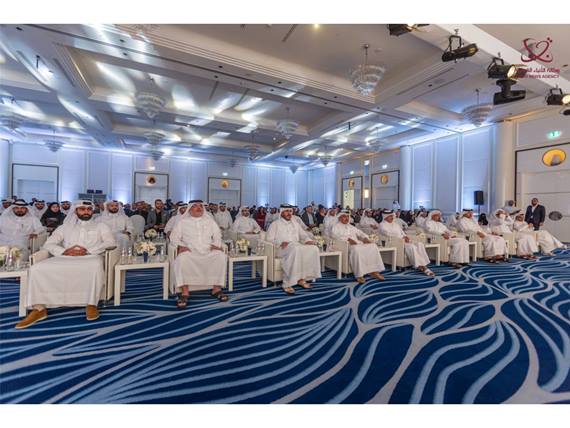ID :
668012
Sun, 09/24/2023 - 20:59
Auther :
Shortlink :
https://www.oananews.org//node/668012
The shortlink copeid
Forum on Government Procurement Plan for 2024 Kicks Off

Doha, September 24 (QNA) - The forum on government procurement plan for 2024 was inaugurated on Sunday in Doha in the presence of HE Minister of Finance Ali bin Ahmed Al Kuwari, HE Minister of Commerce and Industry Sheikh Mohammed bin Hamad bin Qassim Al Abdullah Al-Thani, HE Chairman of Qatar Chamber Sheikh Khalifa bin Jassim bin Mohammed Al-Thani, and several ministries and government authorities officials. The forum, whose activities will continue from Sep. 24 until Oct. 2, aims to introduce the most important axes of the government agencies' procurement plan per sector and the expectations thereof to evaluate the business and needs of government agencies. The forum also highlights the services provided by the Ministry of Finance and the most prominent advantages of the law regulating tenders and auctions and its executive regulations, in addition to identifying local value opportunities and their economic impact, the mechanism and developments of classifying companies and evaluating the performance of companies in implementing government projects. At the opening of the forum, Director of Government Procurement Regulations Department at the Ministry of Finance Nayef Moaid Al Hababi gave a presentation on the general plan for state procurement for the year 2024, during which he indicated that 2,528 tenders are expected to be issued for the year 2024, distributed among 16 economic sectors, and more than 100 economic activities according to the International Standard Industrial Classification (ISIC). Regarding the dates for issuing these tenders, he said that the first quarter will see the issuance of 1,570 tenders, or 65 percent of the total tenders for 2024, the second quarter will see 642 tenders, the third will see 240 tenders, while the last quarter will see 76 tenders. He pointed out that the tenders of the Public Works Authority (Ashghal), Ministry of Public Health (MoPH), Qatar General Electricity and Water Corporation (Kahramaa), Primary Health Care Corporation (PHCC), Aspire Zone, and the Ministry of Education and Higher Education (MOEHE) represent around 70 percent of the total state's tenders for 2024. Sectorwise, he indicated that 85% of the tenders fall within five main economic sectors, namely information and communication sectors with 644 tenders; the wholesale and retail sector with 524 tenders; the building sector with 360 tenders; professional, scientific, and technical services sector with 351 tenders; and administrative and support services with 263 tenders. He indicated that the forum on government procurement plan for 2024 comes within the constant efforts to emphasize the role of the private sector as a critical partner in achieving sustainable development and strengthening the national economy, given the leading role assigned to the private sector in creating job opportunities, stimulating innovation, and providing essential services in the state. The Director of Government Procurement Regulations Department at the Ministry of Finance stressed that the State of Qatar pays great attention to providing an encouraging and appropriate business environment for investment, and seeks to remove obstacles that may face the private sector, which is demonstrated through several axes in terms of benefits and exemptions granted to national companies.
Director of the National Product Competitiveness Support Department at the Ministry of Commerce and Industry Saif Jassim Al Kuwari addressed framework contracts and their role in supporting local industry, stressing that national industries are at the top of the country's development priorities as they represent a key pillar in the advancement of the national economy and an important element for achieving the country's self-sufficiency and building the future of generations to come in line with Qatar National Vision 2030. The State of Qatar, he said, is witnessing a noticeable increase in the number of factories operating in the country, with their number today reaching more than 806 factories. Over the past years, they have realized many achievements contributing to the support of local products and the localization of supply chains, he added. The Ministry of Commerce and Industry, represented by the National Product Competitiveness Support Department, has consolidated aspects of cooperation with the relevant authorities in the country in order to protect and support local products, and has succeeded in building a close partnership with the Ministry of Finance, especially the Government Procurement Department, with the aim of unifying efforts in the field of supporting government procurement of national factory products in order to achieve self-sufficiency for products of strategic importance such as food and pharmaceuticals, he noted. In conjunction with these steps and in order to protect local products from various illegal economic practices, a committee to support the competitiveness of national products against harmful practices was established, and its executive regulations were issued in 2022, Al Kuwari explained. This committee is responsible for taking preventive measures and confronting any foreign practices aimed at expanding the Qatari market at the expense of the national product and flooding the local markets, he said. The Director of the National Product Competitiveness Support Department at the Ministry of Trade and Industry said that the forum represents a pioneering national platform for exploring future prospects and plans for government procurement, and highlights the state's efforts to support the national product and expand its scope to be a major tributary of the national economy. He pointed out that the participation of the Ministry of Commerce and Industry in this meeting is evidence of its commitment to activating the economic role of national industries and Qatari companies and consolidating the principles of true partnership between the government and private sectors in a way that supports the strength of the national economy. (MORE)





